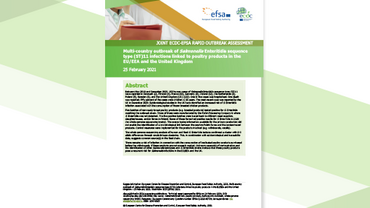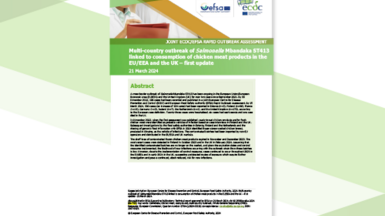Rapid Risk Assessment: Severe respiratory disease associated with Middle East Respiratory Syndrome Coronavirus (MERS-CoV)
The seventh update of the ECDC Rapid Risk Assessment on MERS-CoV addresses the changed epidemiological situation since the previous Rapid Risk Assessment, provides travel advice regarding visits to Saudi Arabia for the Umrah or Hajj pilgrimage, and assesses the risk of importation of MERS-CoV to the EU.
Executive Summary
The latest update of ECDC Rapid Risk Assessment on Middle East respiratory syndrome coronavirus (MERS-CoV) concludes that:
- The risk of importation of MERS-CoV to the EU is expected to continue, and may increase as a result of increasing transmission in Saudi Arabia and increasing number of visitors from the EU to Saudi Arabia during the Hajj pilgrimage in October;
- No cases of MERS-CoV have been reported outside of the Middle East since May 2013, while the number of new cases per month in Saudi Arabia has increased tenfold since April 2013;
- The risk of secondary transmission in the EU remains low;
- Limited human-to-human transmission has occurred. In most clusters, however, the number of confirmed secondary cases remains low;
- The previously reported skewed age and gender distribution has become less accentuated, as more mild and asymptomatic cases are detected through increased contact tracing;
- The proportion of cases associated with healthcare settings accounts for 24% of all reported cases;
- New studies on the potential animal reservoirs of MERS-CoV are available, however, the implications of these findings are still unclear. At this point, the reservoir of MERS-CoV, the potential hosts, and the route of transmission of the virus remain unknown.
The update also informs that, based on a recent survey, all EU/EEA Member States have either the capacity to detect and confirm MERS-CoV or have arranged for cross-border referral for these services. Nineteen of these countries have tested human specimens for MERS-CoV between September 2012 and June 2013.
Update on epidemiological situation
As of 24 September 2013, 133 confirmed cases of MERS-CoV had been reported worldwide, 60 of which have been fatal. To date, all cases have either occurred in the Middle East or have had direct links to a primary case infected in the Middle East. Saudi Arabia has reported 111 cases including 49 deaths, Jordan reported two cases, both fatal, Qatar – three cases including two deaths, and the United Arab Emirates reported five cases including one death.
Twelve cases have been reported outside of the Middle East: United Kingdom (4), Italy (1), France (2), Germany (2) and Tunisia (3). These 12 cases resulted from six separate chains of transmission. The primary case for each chain had been infected in the Middle East and local secondary transmission was reported from the United Kingdom, France, and Tunisia.
Key recommendations
The updated rapid risk assessment provides a number of recommendations including:
- Travellers to the Middle East who develop respiratory disease within 14 days after return to Europe should seek medical attention and immediately communicate their travel history to the healthcare provider;
- Patients presenting with severe acute respiratory infections in the EU should be screened for travel history to Saudi Arabia and the Middle East and for contact with MERS-CoV patients;
- Travellers from the EU who plan to visit Saudi Arabia for the Hajj pilgrimage should consult the recommendations by the Saudi Arabian Ministry of Health and WHO and consider deferring travel if they are above 65 or below 12 years of age, pregnant, suffer from chronic disease, immune deficiency, malignancy or terminal illnesses.






